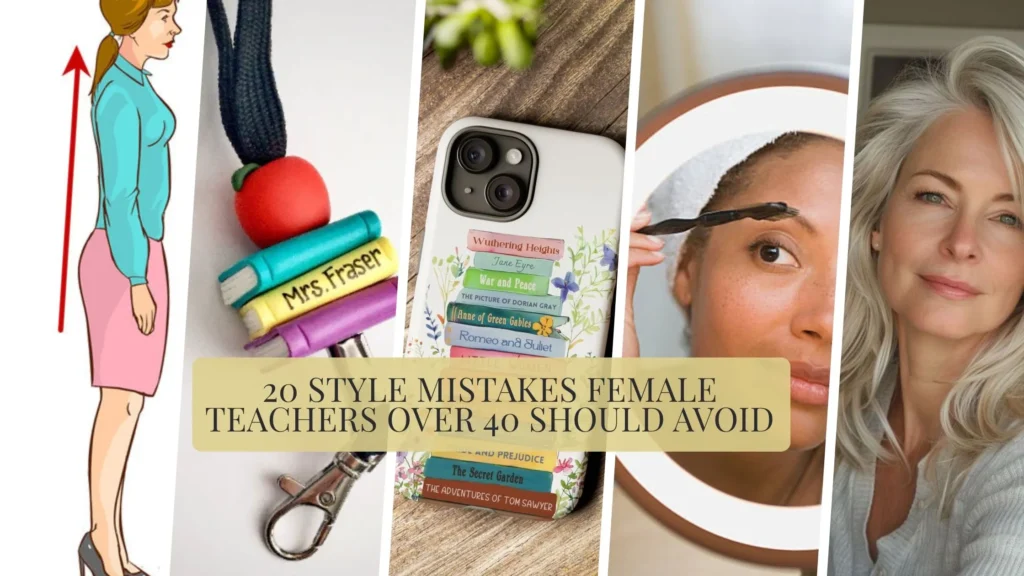This is not another list of what pants to stop wearing or why your blouse feels off by second period.
If you’re looking for summer outfit fixes, fabric tips, or clothing do’s and don’ts, you’ll find all of that in our detailed guide: “18 Summer Clothing Mistakes Teachers Over 40 Should Avoid.”
But if you’ve been teaching for years and your style still feels “off” even when you’re technically dressed then keep reading. Because this article isn’t about fabric. It’s about you.
Teaching after 40 has a way of putting life on autopilot.
You show up early, solve everyone’s problems, and give more than you get day after day. Somewhere in that rhythm, your personal style quietly fades. Not just your clothes, but your presence. Your hair. Your bag. Your posture. Even your tech accessories and the way you carry yourself.
“This isn’t a guide about fabric it’s a reflection of where you are in your life, and how your presence shows up with you.”

It doesn’t happen all at once. But one day, you catch your reflection and think: “This isn’t really me anymore.”
You’re not sloppy. You’re not unprofessional. But you also don’t feel fully aligned with who you are now, the calm, capable, seasoned teacher you’ve become.
This article is about that quiet shift. The small, everyday style mistakes female teachers over 40 often make that have nothing to do with shopping or trends, and everything to do with how you show up, how you feel in your skin, and how your tools, grooming, and habits reflect the woman you’ve grown into.
You don’t need to throw out everything in your closet, you just need a pause to notice what no longer reflects you.
You just need a moment of reflection to notice what’s no longer serving you, and to gently update how you move through your day.So if you’re ready to reconnect with your real presence, not just your outfit, here are 20 of the most common style mistakes teachers over 40 make, and how to start feeling like yourself again.
Table of Contents
1. Using the Same School Bag for 6+ Years Without Updating
It’s with you every single day but it stopped serving you years ago.
That old school bag? The one with the fraying strap, the sticky zipper, the ink-stained lining? You’ve been carrying it out of habit, not intention.
Here’s the truth:
Your school bag isn’t just a tool. It’s part of your personal style, part of the first impression you make as you walk into your classroom or a parent meeting. When it’s worn-out or overly “functional,” it sends a message: I don’t have time for myself anymore.
You don’t need something trendy. But you do need something that reflects the capable, present woman you are now. Something clean, structured, and intentional because even your bag carries energy.
“Sometimes it’s not the weight of the bag, it's what it silently says about you.”
Swap the bag, and you might just feel lighter in more ways than one.

2. When Your Shoes Are Just as Worn Out as Your Bag
If your bag is falling apart… your shoes probably are too.
That same pair of flats or slip-ons you’ve trusted for years? You wear them because they’re easy. Because they “still work.” But deep down, you know they’ve stopped supporting you in every sense.
They’re stretched, scuffed, maybe even a little lopsided.
By lunch, your feet ache. By dismissal, you’re dragging. And even though no one’s staring at your shoes, they quietly affect how you stand, walk, and show up in a room.
“Worn-down shoes don’t just look tired they make you feel tired, too.”
This isn’t just about what looks good, it’s about what helps you feel supported, physically and emotionally.
And it leads us straight into the next mistake the one most teachers make without even realizing:
Choosing comfort… and forgetting presence.

3. When “Just Getting Through the Day” Becomes Your Default Look
You’ve got the old bag. The worn shoes. And now the whole outfit quietly says: survival.
It’s not that you don’t care. It’s that you’re tired. You dress for ease, not expression. You pick what won’t wrinkle, what has pockets, what hides sweat and forget to ask: “Does this reflect me anymore?”
This is where style slips quietly.
Not because you stopped trying, but because every day is about getting through. The emotional weight of teaching, caregiving, and always showing up for others begins to mute your own presence.
“When your outfit feels like armor… it’s time to ask what you’re protecting.”
And if this point hits home if you’ve caught yourself grabbing the same tired outfits over and over then you’ll want to read this next:
👉 18 Summer Clothing Mistakes Teachers Over 40 Should Avoid
It’s a real-life guide to the outfit habits that creep in quietly and how to fix them without overhauling your whole wardrobe.This isn’t about buying something new. It’s about choosing differently.
Because the presence you carry isn’t found in a label. It’s in the moment you pause and say: “I’m allowed to feel like myself again.”

4. Tying Your Hair the Same Way Every Single Day
What starts as convenience slowly becomes invisibility.
That quick bun, the reliable claw clip, or the same low ponytail it’s your morning shortcut. It keeps hair off your face, survives recess duty, and feels easy in the rush. But over time, it also becomes your unspoken signature… and not always in a good way.
Here’s the quiet cost:
You stop seeing your hair as a part of your presence.
It’s just “something to get out of the way.” And in that mindset, you slowly stop showing up not just in the mirror, but in energy, in confidence, in how you enter the room.
“Your hair doesn’t need to be perfect. It just needs to feel like it belongs to the woman you are now.”
Even a 10-second shift, a softer parting, a low twist, or a textured braid can change your whole tone. Not for others… for you.
Because when you tie back your hair every day without thought, you often end up tying back pieces of your identity, too.
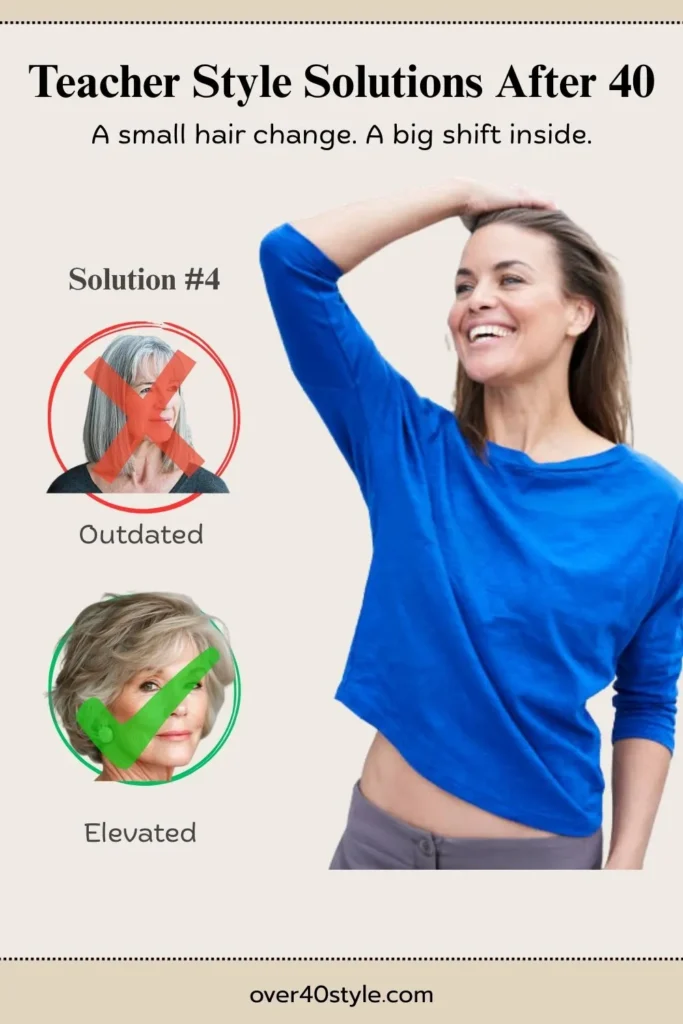
5. Keeping the Same Haircut or Color for 10+ Years
You’ve changed but have your hair?
That layered bob, deep side part, or once-trendy highlight pattern might have suited you perfectly… a decade ago. But now? It may no longer reflect your current features, lifestyle, or energy.
Here’s what happens:
You hold onto the same style because it’s familiar. It “works.” You know how to manage it quickly before school. But slowly, it stops matching the face you see in the mirror or the phase of life you’re living.
“The problem isn’t the cut. It’s the gap between who you are… and what you’re still holding onto.”
This isn’t about chasing trends or covering grays. It’s about realignment.
Maybe your current season needs something softer. Or bolder. Or lower maintenance. Even a small change, a refreshed shape, a warmer tone, a cleaner grow-out can make you feel like you’ve stepped forward instead of standing still.Because you’re not the woman from ten years ago.
And your hair shouldn’t pretend you are.

6. Wearing Old or Bent Glasses Frames That Don’t Fit Anymore
Your glasses sit at the center of your face but somehow become the last thing you notice.
That same pair you’ve worn since 2012? Maybe they once felt sleek or quirky. But now they’re slipping, scratched, or subtly distorting your expression and you don’t even realize it.
Why does it matter?
Because outdated or ill-fitting glasses don’t just impact your vision they quietly change your whole face.
They drag down your features. Make your eyes look smaller. Or simply clash with your current style, tone, or energy.
“The wrong frames make you look tired, even when you’re not.”
And let’s be honest you wear them more than any other accessory.
So don’t treat them like an afterthought. A small update in shape, color, or lift can brighten your whole presence not because it makes you look “young,” but because it helps you look like you again.

I know how tempting it is to prioritize comfort above all else — I’ve done it too. That’s why I created Say Goodbye to Boring Teacher Outfits Over 40. It’s full of outfit combinations that feel relaxed but still show you care about how you show up.
7. Skipping the Small Grooming Details That Add Polish
Small grooming details aren’t about vanity, they’re quiet signals that you still see yourself.
Dry lips. Chipped nails. Unshaped brows. These aren’t huge things but they quietly shape how “put-together” you feel in the hallway, in front of parents, or during an impromptu staff meeting.
These little details do two things:
- They signal care to others, yes, but also to yourself.
- They bring back intention which is something many teachers lose when life becomes survival mode.
“It’s not vanity. It’s visibility.”
You don’t need salon appointments or elaborate routines.
Just a 30-second brow brush. A tinted lip balm. A clean, short nail. These are the kinds of small, manageable touches that quietly say: I’m still here. I still see myself.
And that mindset shift? It ripples into everything else.

8. Sticking to the Same Makeup Routine You’ve Used for 15+ Years
Makeup isn’t supposed to hide your age but it also shouldn’t drag your face backward.
Heavy eyeliner. Matte foundation. Frosty eyeshadow. Harsh contour lines. These were all trends once… but now? They often settle into fine lines, harden your expression, or make your face feel more “done” than needed.
The bigger issue?
You’re not applying makeup for you anymore, you’re just repeating what used to work. No tweaks. No updates. No consideration for how your skin, features, or tone have changed.
“Makeup should soften you into your presence, not harden you into memory.”
This doesn’t mean throwing it all out.
It means shifting your mindset: less coverage, more glow. Creams over powders. Subtle liner instead of sharp wings. Lip tints instead of bold mattes. Because you don’t need to cover yourself. You need to see yourself again.

9. Wearing the Same Jewelry Every Day Even If It’s Tarnished or Broken
You don’t notice it anymore but others do.
That bracelet you “always wear”? The once-loved necklace with a kinked chain? Or the earrings you haven’t changed since spring break? They’ve become background noise to you… but they still speak for you.
Here’s the quiet mistake:
You’re not choosing your jewelry, you’re just repeating it.
And over time, even the most sentimental piece can start to dull your look if it’s tarnished, tangled, or no longer matches who you are now.
“Jewelry is energy. It finishes your sentence without words.”
This isn’t about being flashy. It’s about being fresh.
Swap one tired bracelet for a clean, minimal bangle. Try simple hoops instead of those too-familiar studs. Or just rotate what you already own with intention.
Because even the smallest detail when chosen with care can shift how you feel the moment you walk into a classroom.
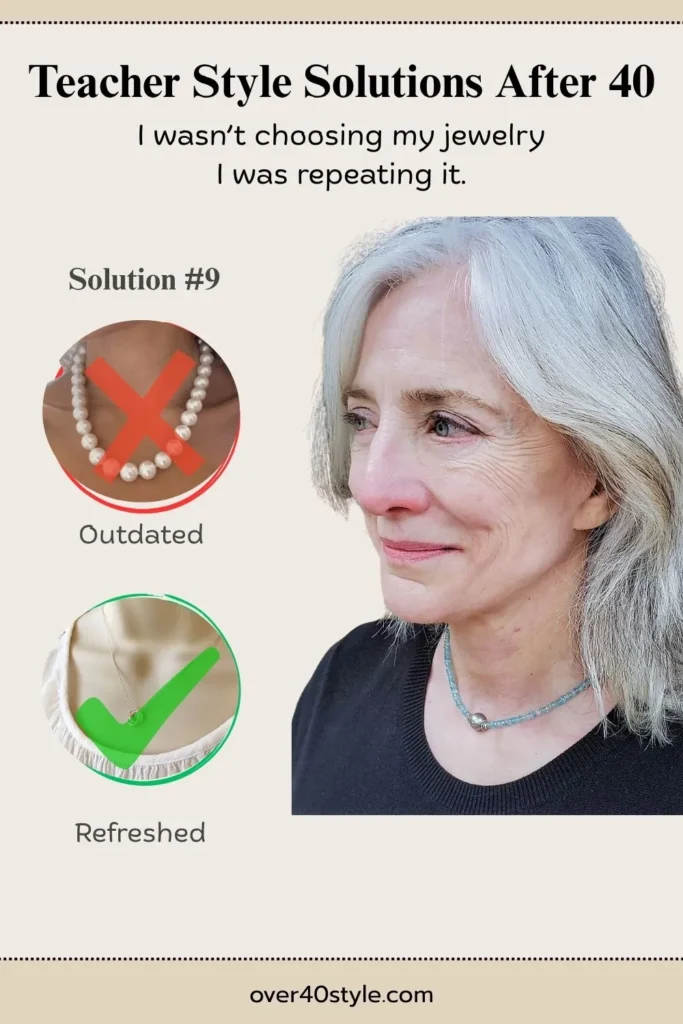
Your jewelry feels outdated, here’s a clean, minimal set on Amazon that brings quiet polish, without losing you in the process. [amazon]
10. Letting Your Lanyard Become Loud, Messy, or Overloaded
What started as practical… is now quietly chaotic.
Keys jangling. Badge pulling at your neck. Trinkets from past students, broken pens, sanitizer bottles, and faded ID tags. Over time, your lanyard becomes less of a tool and more of a tangled distraction.
It adds visual clutter to your presence.
Even if your outfit is polished, a messy lanyard can throw off the whole balance. It tugs at your neckline, swings when you walk, and creates a subtle feeling of disorganization.
“Style isn’t just about what you wear. It’s also about what you carry and how it moves with you.”
A simple fix?
Streamline. Keep only what you use. Choose a clean, sturdy, neutral lanyard that complements your wardrobe, not fight with it.
Because when the details are calm… you feel calm too.
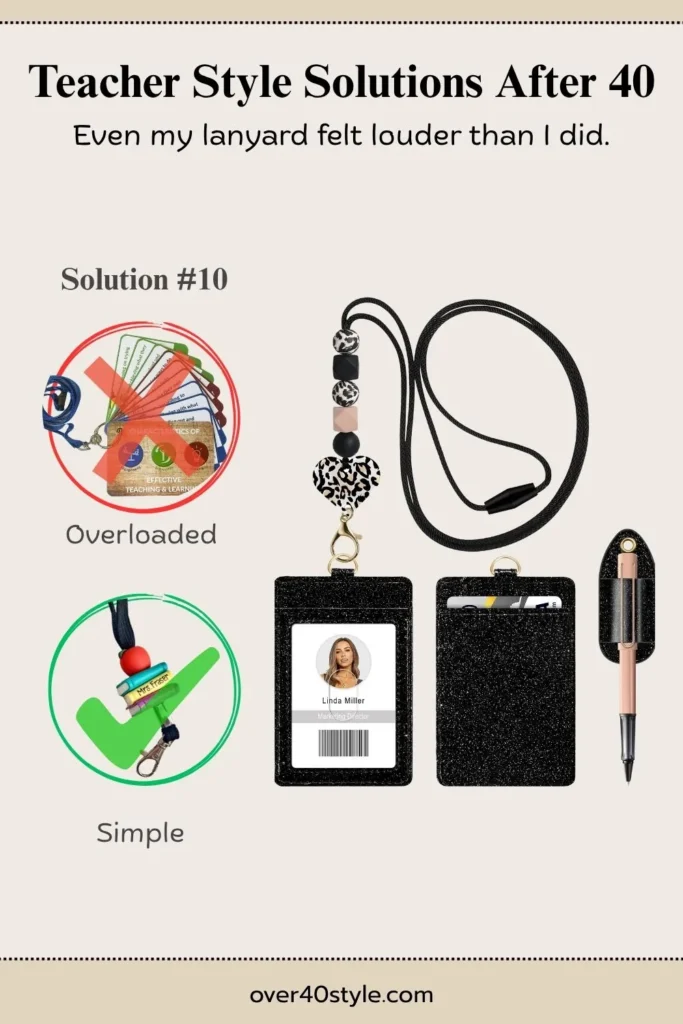
But now, if you’re ready to upgrade, here’s a clean, teacher-approved lanyard on Amazon that actually looks grown-up, not cluttered. [amazon]
11. Carrying an Outdated, Cracked, or Juvenile Phone Case
You hold it constantly so yes, it’s part of your style.
Whether you’re taking attendance, emailing parents, snapping classroom pics, or checking the time between periods… your phone is always in sight. Which means: your phone case speaks louder than you think.
Here’s the catch:
If it’s cracked, dingy, overloaded with stickers, or looks like something your students might use, it quietly clashes with the mature, grounded presence you bring to the classroom.
“Style isn’t just what you wear, it's everything you touch.”
The fix doesn’t have to be fancy. Just intentional.
Swap the neon plastic for a clean leather sleeve. Go for a neutral tone. Choose something that feels aligned with your energy now, not who you were five years ago.
Because you’ve evolved. And the things you carry should evolve with you.
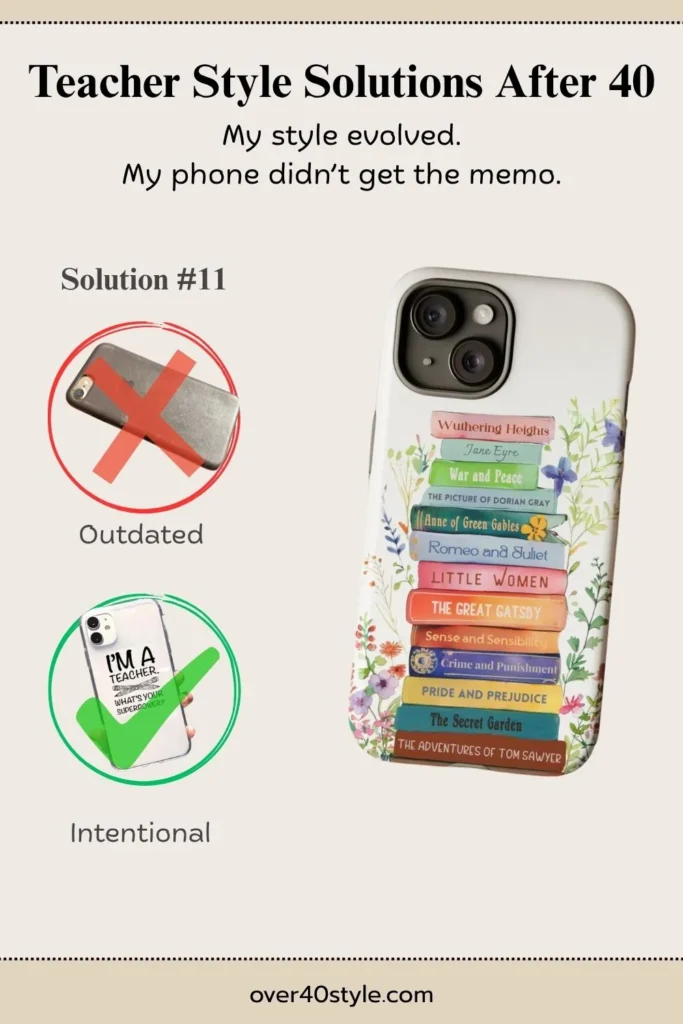
Now, if you’re ready for a grown-up phone case that matches your energy, here’s a teacher-favorite option on Amazon. [amazon]
12. Treating Tech Accessories Like They Don’t Count
Dusty tablet. Scratched case. Tangled cords.
They sit on your desk, peek out of your tote, and show up every time you teach from a screen yet somehow, they’re the last thing we think to clean, replace, or align with our overall presence.
But here’s the thing:
You’ve worked hard to feel calm and confident in the classroom… and that vibe gets disrupted when your tools feel chaotic.
“Your tools are part of your visual language even if they’re not worn on your body.”
Just like a frayed cardigan throws off an outfit, a beat-up stylus or sticker-covered Chromebook sleeve throws off your flow.
Swap the tangled cord for a sleek organizer. Wipe the screen. Use a case that says “grown professional,” not “this’ll do.”
Because when your tools reflect clarity, so do you.
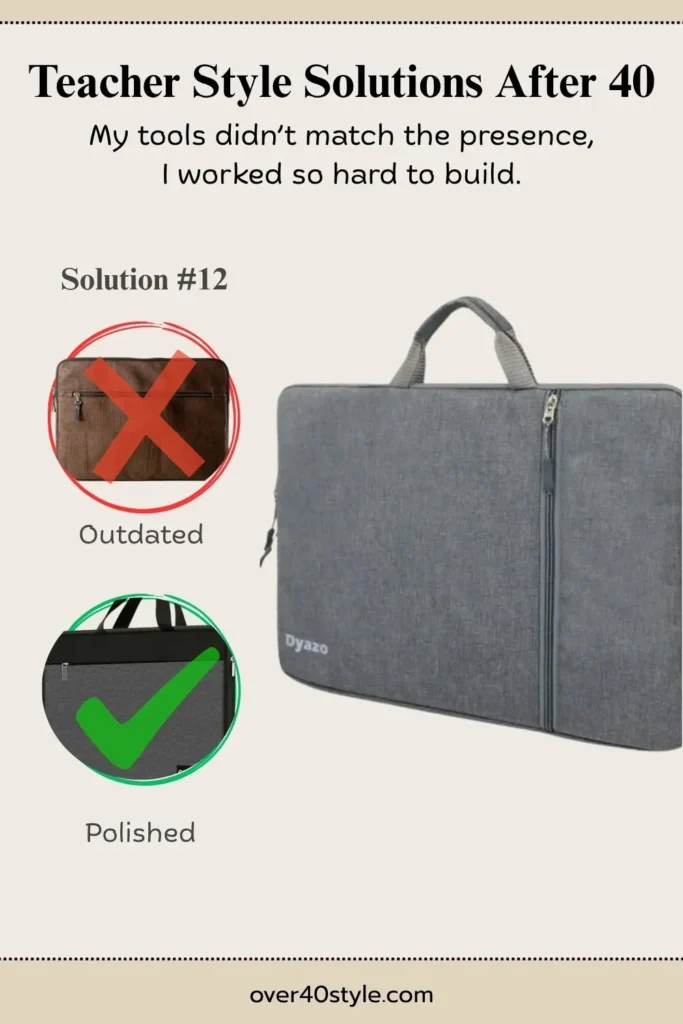
Tech tools could use an upgrade, here’s a clean, classroom-ready organizer set on Amazon that makes your desk (and mindset) feel instantly calmer. [amazon]
13. Carrying a Posture That Tells the Wrong Story
It’s not slouching. It’s shrinking without realizing it.
Shoulders slightly hunched. Head down while walking. Arms crossed during meetings. These small habits can build up, especially in a profession where you’re constantly multitasking, comforting, or navigating stress.
Here’s the quiet cost:
Even when you’re dressed well, poor posture can send a message that you’re unsure, overwhelmed, or tired even if you’re none of those things.
“Your presence walks into the room before your words do.”
This isn’t about standing tall for others.
It’s about reconnecting with yourself. Rolling your shoulders back. Meeting your reflection. Walking into school like your experience matters because it does.
And when you adjust how you hold your body, everything you’re wearing suddenly feels more intentional, too.

14. Wearing a Facial Expression That No Longer Matches Your Inner Self
You’re not sad. You’re not angry. But… your face says otherwise.
Years of holding it together through meetings, grading, hallway duty, emotional moments can settle into your features. A hardened jaw. A tight brow. A tired gaze. Not because you feel that way, but because it became your default.
Here’s what we forget:
The face you make all day becomes your resting expression. And that resting expression becomes part of your personal style even if your outfit is polished.
“Your expression is your energy. If it’s stuck in survival mode, so is your presence.”
Take a second in the mirror. Breathe. Let your face soften.
Smile not for others, but for yourself. When your expression reflects who you really are now, calm, capable, warm people respond to you differently. And more importantly… you feel different too.
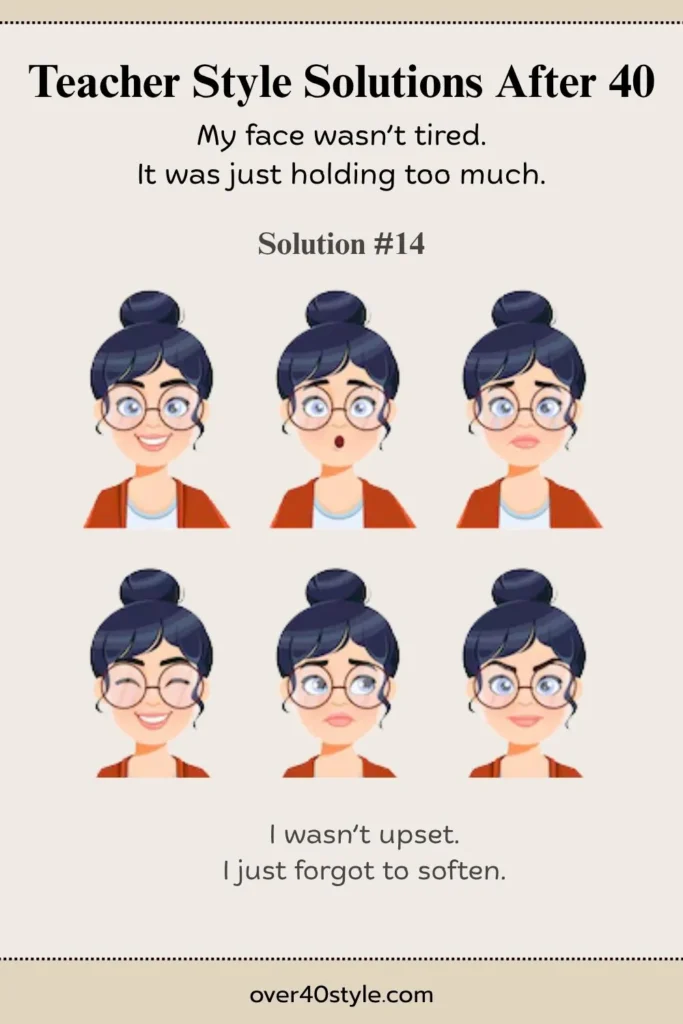
15. Overloading Your Pockets or Belt Loops With “Just-in-Case” Stuff
Keys. Tissues. Sanitizer. Badge reels. A sticky note from the first period.
It starts with practicality but before you know it, your hips are weighed down, your silhouette is bulging, and your outfit starts losing its shape and clarity.
Here’s what happens:
You wear a nice top, polished pants… and then clip three things to your belt loop, jam tissues in one pocket, and keys in another.
And just like that, your energy feels scattered.
“Carrying everything makes it look like you’re carrying too much even when you’re not.”
You don’t have to go minimalist.
Just intentional. Use a slim pouch. Keep extras in your tote, not on your body. Because when your clothes can move freely you move more freely too.

16. Never Cleaning Out Your Teacher Tote (or That One Desk Drawer)
Old pens. Crushed cough drops. Papers from a month ago.
That big bag you carry or the drawer you open daily is a reflection of what you’ve been holding onto.
And if it’s filled with outdated, broken, or “someday” items, it doesn’t just create clutter… it subtly creates drag.
Here’s what happens:
You reach in for something useful and instead feel overwhelmed. That quiet chaos leaks into your posture, your transitions, even how you speak or walk.
“Your outer clutter echoes your inner energy. Even if it’s just a tote bag.”
Take 10 minutes to empty it. Keep only what supports your day now. Replace the ripped file folder. Toss the sticky candy wrapper.
Because when you make space in the small places, you make space in your presence, too.
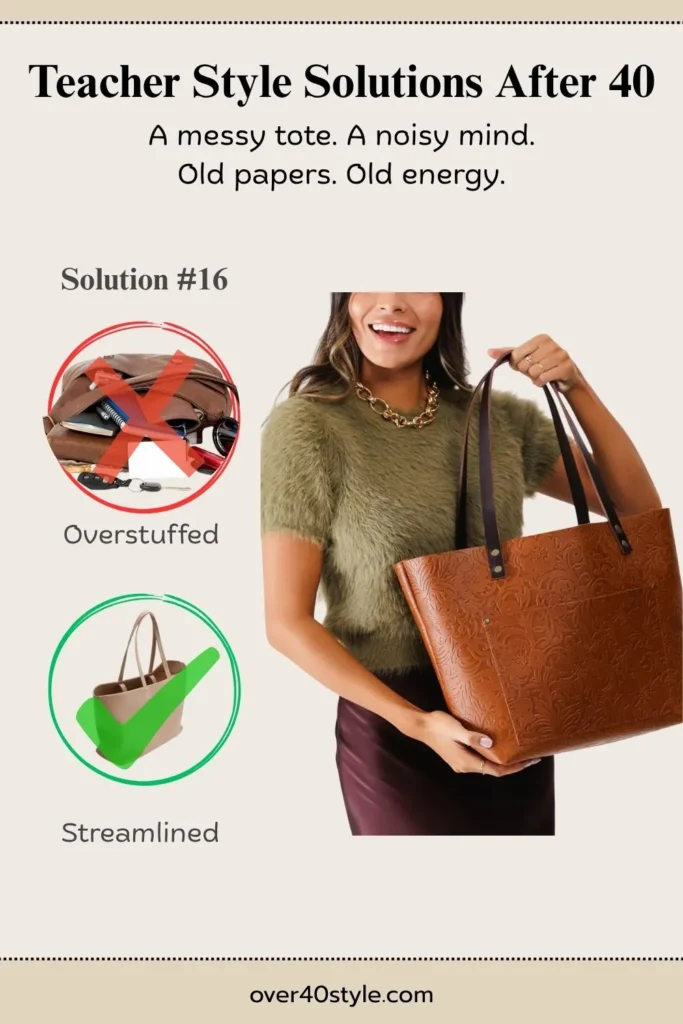
17. Dressing in “Invisible” Colors Just to Feel Safe
Beige. Navy. Black. Repeat.
Not because you love those colors but because they help you blend in, avoid attention, or skip decision fatigue. And at first, that makes sense. You’re busy. You need simplicity.
But over time?
This quiet uniform of invisibility can chip away at how seen you feel even by yourself.
“Style isn’t about standing out. It’s about to disappear.”
You don’t need neon or patterns.
Just one intentional choice: a scarf in a color that lifts you. A soft pink lip. A warm-toned top that reflects the light in your face.
Because you’re not trying to be trendy. You’re just trying to feel present again.
And that starts with letting yourself be visible in your own gentle way.
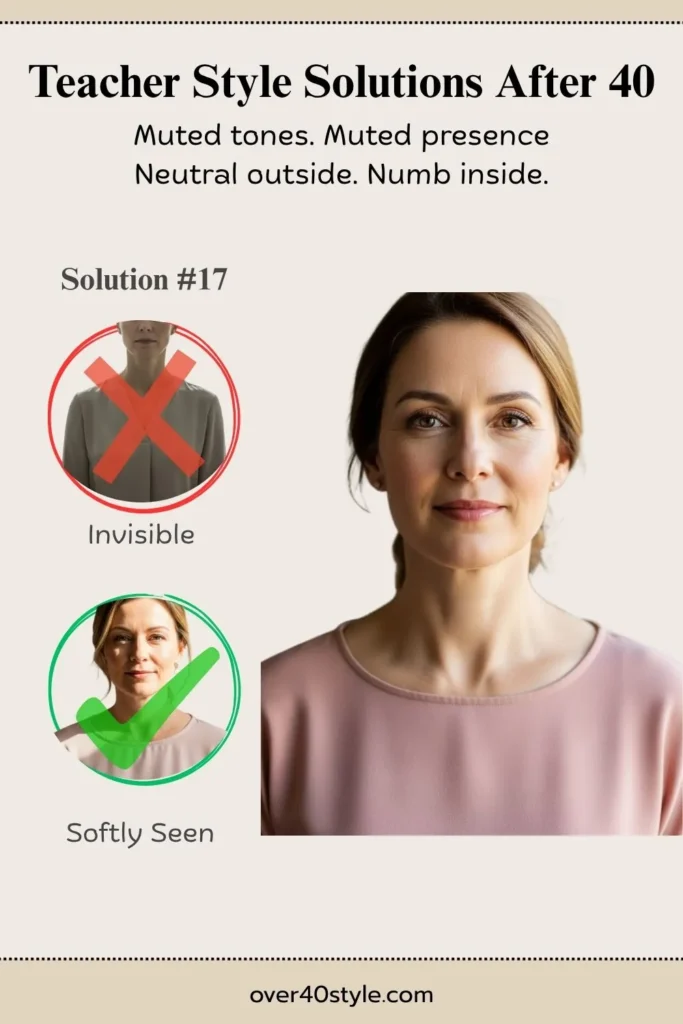
18. Dressing to Survive the Day Not to Show Up in It
“This is fine.” “It’ll do.” “It’s just school.”
Those quiet phrases you whisper in the morning mirror? They add up.
And suddenly, getting dressed becomes a survival routine not a moment of self-connection.
Here’s the shift:
You’re technically dressed. You’re technically professional. But you don’t feel like yourself. Not fully.
And that’s where style stops being about fabric and starts being about alignment.
“When you only dress to survive, your presence starts to disappear.”
Try this instead:
Choose one thing each morning that feels intentional, not rushed.
Maybe a top you love the texture of. Maybe a lip balm that smells like ease. Maybe earrings that remind you who you were before the burnout. You don’t have to overhaul your wardrobe, just reconnect with how you want to feel.
You just need to stop dressing like you’re bracing for the day and start dressing like you belong in it.
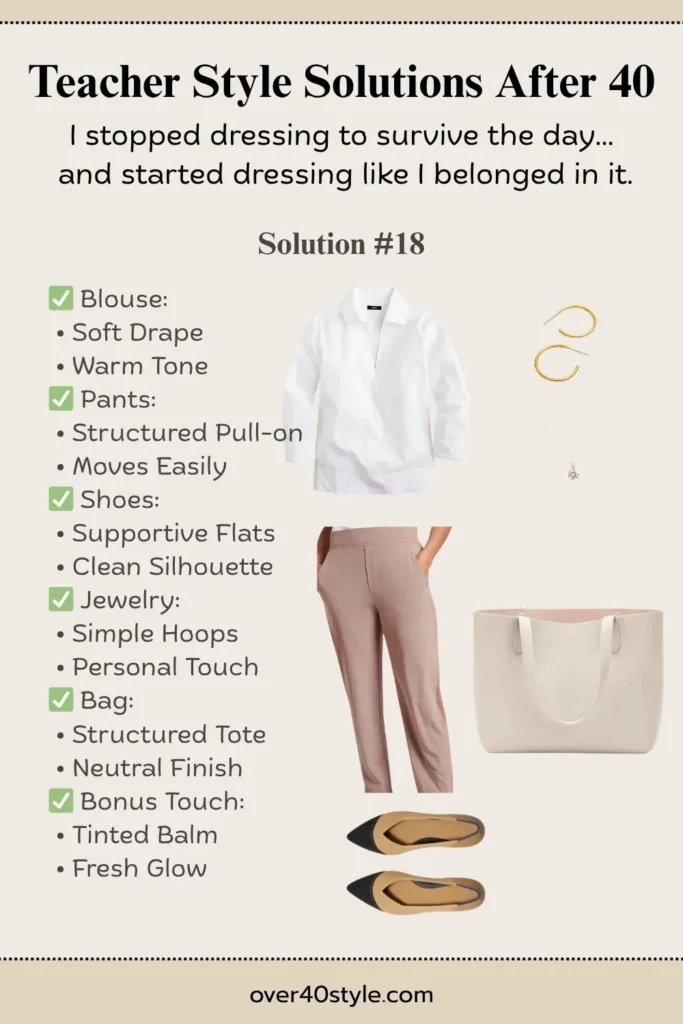
19. Using Style to Hide Instead of Express
Big layers. Safe colors. Repeating the same look day after day.
You’re not lazy. You’re not sloppy.
You’re just protecting yourself.
Because when life gets overwhelming, when the classroom drains you, when you haven’t had space to reflect, the easiest thing to do is to reach for what feels “invisible.”
But here’s the catch:
What protects you can also quietly erase you.
“There’s a difference between dressing with comfort and dressing in hiding.”
Oversized cardigans, pulled-back hair, silent jewelry, nothing that draws attention…
It all makes sense when you’re surviving. But style was never meant to be armor.
It was meant to be your whisper. Your presence. Your soft way of saying, “I’m still here.”
So the next time you get dressed, ask:
“Am I expressing something… or hiding something?”
You might be surprised by the answer and even more surprised by how it feels to choose differently.

20. Forgetting That Style Is Emotional, Not Just Visual
Style at this age has nothing to do with trends or numbers. It’s about how you feel when you walk into that room.
It’s about how you feel when you walk into your classroom.
How you sit in that meeting.
How you glance at your reflection and think, “Yes. That’s me.”
Because real style doesn’t shout.
It doesn’t beg for compliments.
And it certainly doesn’t need to chase youth.
“True style is when your outside finally matches the woman you’ve already become on the inside.”
So maybe it’s time to stop asking, “Does this look good?”
And instead ask, “Does this feel like me now?”
If it doesn’t, that’s okay.
It just means you’re ready to realign.
Not reinvent. Just reconnect.

Finally… A Return to You
This journey was never about chasing trends or buying something new. It’s about pausing long enough to notice when your outer world no longer reflects the strong, steady woman you’ve quietly become. You’ve spent years showing up for everyone else — in the classroom, in meetings, at home. But somewhere along the way, showing up for yourself got buried beneath the routine: the same bag, the same posture, the quiet burnout.
Now, it’s not about rushing into change. It’s about realignment. A quiet return to yourself.
Because when your presence catches up to your growth, everything shifts. You move differently. You teach differently. And most of all — you finally feel like you again.
💬 Did we miss a habit that helped you reconnect with your style? Drop it in the comments and your story might help someone else.
✨ Want to go deeper?
→ Say Goodbye to Boring Teacher Outfits Over 40
→ These Style Mistakes Are Aging You – Change It Now!
Sometimes, it’s not about a new outfit
It’s about coming home to yourself.
What Teachers Over 40 Are Asking About Style?
We’re not trying to win best dressed, we just want to feel like ourselves again when we walk into that classroom.
❓ What should female teachers over 40 avoid wearing?
You know that cardigan you’ve had forever? The one that’s a little stretched out but just feels like home? I had one too until a student asked if it belonged to their grandma. That’s when I realized: comfort’s great, but some pieces stop supporting how we want to show up. We don’t need to “dress up,” just dress in a way that feels like we own the room because we do.
❓ Can teachers over 40 still wear jeans in the classroom?
Of course we can. But maybe not the ripped, super-skinny kind that keeps slipping down every time you write on the board. I stick to dark straight-legs or bootcuts they feel current but don’t try too hard. Trust me, they still say “I’m cool” just not “I’m 22.”
❓ What colors flatter women over 40 the most?
I used to wear black all the time until one day, it just felt… flat. Like it drained me. Now I reach for navy, deep green, soft blush, or burgundy they bring out warmth and don’t fight with my skin the way black started to. It’s a small switch that feels surprisingly good.
❓ How can I stay comfortable while still looking put-together at school?
Comfort isn’t the enemy sloppy is. I found my sweet spot with soft trousers, knit dresses, and a blazer that feels like a hoodie but looks like authority. I’m in flats most days, but I pick ones that don’t scream “forgot my real shoes.”
❓ Should I change my hairstyle after 40 to look more current?
Only if you feel like it. I changed my part last year not because of my age, but because I just wanted to see something different in the mirror. Sometimes, a fresh shape or softer style isn’t about looking “younger.” It’s about looking like you again.
